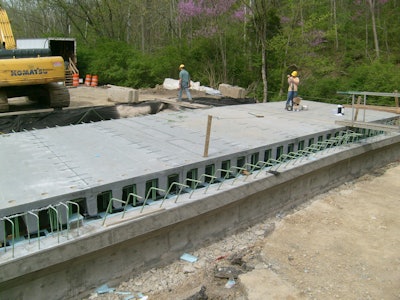 Eight Mile Road, the first site in the U.S. to use a Fiber Reinforced Polymer (FRP) composite superstructure. It also used a drop-in-place technology.
Eight Mile Road, the first site in the U.S. to use a Fiber Reinforced Polymer (FRP) composite superstructure. It also used a drop-in-place technology.According to a study released by the Transportation Research Board, innovative materials and technologies, such as fiber-reinforced polymer composites and high-performance concrete, are reducing bridge maintenance, life-cycle costs, and construction time, the Engineering News-Record reports.
The study reportedly analyzed the performance of close to 400 construction and repair projects in 20 states, including approximately 150 bridge projects, between 1999 and 2005 through the Federal Highway Administration’s (FHWA) Innovative Bridge Research and Construction Program (IBRC).
According to the news agency, the study’s authors concluded that it was “likely” the program helped reduce costs based on the physical properties of the materials and cost comparisons of several IBRC technologies in state highway programs, and that accelerated bridge construction and monitoring technology “could produce much greater savings if used more widely in appropriate applications.” The study noted that high-performance steel and concrete, stainless steel rebar, and externally bonded FRP reinforcement have been accepted in state highway bridge programs, but some technologies, such as FRP deck and superstructure elements, would require more development and evaluation to determine their proper use and potential.
“[FRP composites] are no longer ‘innovative,’ but rather a standard, best-in-class material,” said Tom Dobbins, president of the American Composite Materials Association, according to the news agency. “Engineers can specify components with confidence that they’re using validated materials.”
The study calls for a new federal grant program to provide incentives for the development of innovative technologies for bridge construction. It also calls for continued funding of FHWA’s Center for Accelerating Innovation and establishing research and demonstration programs at the state level .








